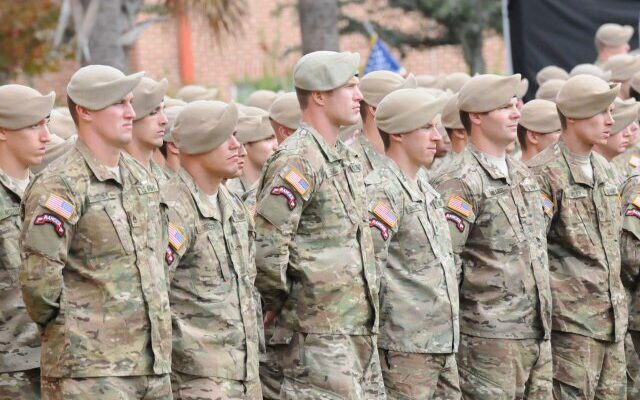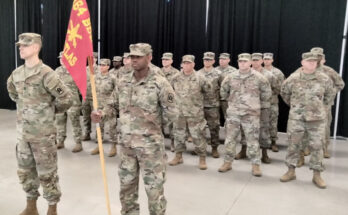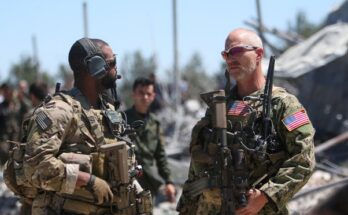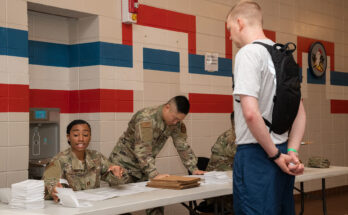United States Army Rangers Recruitment: The United States Army Rangers are an elite faction within the U.S. Army, renowned for their exceptional bravery, skill, and dedication. Originating from the early days of the American Revolution, they have since played pivotal roles in various military operations, representing the epitome of valor and expertise.
Recruitment is paramount to the continuous evolution and strengthening of the Rangers unit. With the ever-evolving nature of modern warfare, it becomes essential to attract and integrate the best talents, ensuring the Rangers remain at the forefront of military excellence.
By focusing on strategic recruitment, the unit can guarantee its longevity, adaptability, and continued relevance in defense operations. This not only bolsters the unit’s capabilities but also upholds the rich legacy of the Rangers, ensuring a brighter and more secure future.
History and Legacy of the United States Army Rangers
The United States Army Rangers have a storied legacy that has evolved alongside the nation’s history. From their roots in the American Revolution to their pivotal roles in modern conflicts, the Rangers have consistently exemplified bravery, skill, and dedication.
Origins and Evolution of the Army Rangers
The inception of the Army Rangers can be traced back to the American colonial period. Inspired by the rough frontiersmen and the tactics of Native American tribes, Benjamin Church and John Mosby are among those credited with forming the first Ranger-style forces during the late 17th and early 18th centuries. Their primary mission? Conducting deep reconnaissance and executing swift raids against enemy positions.
As the United States grew and faced new challenges, so too did the Rangers. Throughout the Revolutionary War, the Civil War, and both World Wars, the Rangers adapted, adopting new strategies and integrating the latest technology. They transitioned from irregular frontier fighters to specialized light infantry, capable of executing missions behind enemy lines.
Significant Missions and Roles Throughout History
One cannot discuss the Army Rangers without highlighting their key missions. In World War II, they played a crucial role in the D-Day landings at Normandy, scaling the cliffs at Pointe du Hoc and eliminating artillery positions threatening the main landing zones. This operation is often cited as a testament to their tenacity and skill.
In more recent times, the Rangers were instrumental in operations in both Iraq and Afghanistan, undertaking high-risk missions that targeted key enemy leaders and infrastructure. Their adaptability has seen them engage in everything from direct combat to training indigenous forces.
From their inception to today, the legacy of the Army Rangers is one of resilience, adaptability, and a commitment to excellence. As the world changes, so too will the Rangers, ready to meet any challenge with determination and skill.
Prerequisites and Basic Requirements of United States Army Rangers
Becoming a U.S. Army Ranger is a challenging endeavor that demands dedication, resilience, and certain qualifications. Below are some of the foundational prerequisites and requirements needed:
Age, Citizenship, and Educational Qualifications
Age: Prospective candidates must be within a specific age bracket. Typically, this is between 18-34 years, but age waivers are available in certain circumstances.
Citizenship: To be eligible, one must be a U.S. citizen.
Education: At a minimum, aspirants should have a high school diploma or General Educational Development (GED) certificate. However, possessing higher educational qualifications can be advantageous.
Physical Fitness and Medical Criteria
Physical Fitness: Aspiring Rangers must pass the Army Physical Fitness Test (APFT) with a high score, demonstrating strength, endurance, and cardiovascular health. They should be prepared for rigorous training and physical challenges.
Medical Standards: Candidates must meet the Army’s medical fitness criteria, which includes eyesight, hearing, and general health benchmarks. Any significant medical conditions or issues might be a disqualifier.
Prior Military Service Considerations
- Individuals with prior military service are encouraged to apply, but they should be aware of the different entry paths and considerations. Previous service in combat roles or infantry can be beneficial.
- Discharges other than honorable may hinder the application process. Candidates should ensure they are in good standing with their prior or current military obligations.
In essence, the journey to become a U.S. Army Ranger starts with meeting these foundational criteria. Beyond these, a deep commitment, resilience, and relentless pursuit of excellence are vital for success in the Rangers.
Overview of United States Army Rangers Recruitment Programs
Joining the Rangers is a prestigious accomplishment, but getting there requires passing through a detailed recruitment program. Here’s an overview of the purpose, objectives, and general structure of these recruitment programs.
Purpose and Objective of Recruitment Programs:
The main purpose of the Army Rangers recruitment program is to identify and select the best candidates who possess the mental, physical, and emotional fortitude to excel in one of the military’s most demanding roles. The program is designed to:
Attract: Reach out to potential candidates from diverse backgrounds, ensuring that all who have the desire and capability to serve as Rangers get an equal opportunity.
Assess: Evaluate candidates based on a set of rigorous criteria that measure not only their physical prowess but also their cognitive abilities, leadership potential, and resilience.
Develop: Offer successful candidates the training and mentorship needed to help them reach the high standards of the Rangers.
General Structure of the Recruitment Process:
The recruitment process for the Army Rangers is both exhaustive and competitive. The structure generally consists of:
Outreach: This involves advertising campaigns, informational sessions, and recruitment events to raise awareness about the opportunities within the Rangers.
Basic Qualifications: Before entering the actual recruitment process, candidates must meet certain baseline requirements, including age, citizenship, and educational qualifications.
Physical and Mental Assessments: These are designed to test a candidate’s stamina, strength, adaptability, and mental acumen. Common tests include the Army Physical Fitness Test (APFT) and specialized tasks relevant to the Ranger role.
Interviews: Qualified candidates then undergo a series of interviews where their motivations, leadership potential, and problem-solving abilities are assessed.
Training: Successful candidates are admitted to the Ranger Assessment and Selection Program (RASP), an intense multi-week training program where they learn the skills necessary to operate as a Ranger.
Final Selection: Upon successful completion of RASP, candidates are officially inducted as Army Rangers.
By maintaining a stringent and rigorous recruitment process, the United States Army ensures that only the best and most capable individuals earn the honor of wearing the Ranger tab.
Basic Training and Ranger Assessment Phase
Every journey in the military begins with a foundational step. For those aspiring to be elite soldiers, especially Rangers, this step is incredibly significant. The groundwork of skills and knowledge laid here is not just beneficial, but vital, to meet the demanding challenges of specialized roles.
The Importance of Basic Combat Training (BCT)
Basic Combat Training, commonly referred to as BCT, is where every recruit learns the cornerstones of being a soldier. This rigorous 10-week program serves multiple purposes:
Skill Acquisition: Recruits are taught essential skills, from marksmanship to first aid, ensuring they have the necessary tools to be effective in the field.
Physical Fitness: BCT pushes soldiers to their limits, conditioning them to the demanding physical standards of the army. This builds resilience and endurance.
Discipline and Teamwork: Perhaps more important than the tangible skills are the intangible ones. BCT fosters discipline, respect for the chain of command, and the importance of working as a cohesive unit.
Given its foundational nature, BCT is indispensable. It transforms civilians into soldiers, ready for the advanced challenges that lie ahead.
Overview of Ranger Assessment and Selection Program (RASP)
For those who aspire to join the ranks of the elite 75th Ranger Regiment, the Ranger Assessment and Selection Program, or RASP, is the gateway. This is an intense, 8-week program aimed to test and validate soldiers both mentally and physically.
RASP goes beyond basic skills. It delves deeper into advanced tactics, leadership training, and specialized tasks unique to Rangers. Additionally, candidates undergo psychological evaluations to ensure they possess the mental fortitude required for high-stress operations.
Challenges and Outcomes of These Initial Phases
Both BCT and RASP are designed to be challenging, but the hurdles serve a purpose:
Weeding Out: Not everyone is cut out for the military, and even fewer for specialized roles like the Rangers. These phases identify and retain only the best.
Adaptability: The unpredictable nature of these trainings instills an ability to adapt to ever-changing situations – a key trait in combat.
Camaraderie: Shared challenges foster deep bonds among soldiers, ensuring they can trust and rely on one another in the heat of battle.
However, the Basic Training and Ranger Assessment Phase form the bedrock upon which a soldier’s military career is built. The lessons learned, the bonds formed, and the challenges overcome during these initial phases play a pivotal role in shaping the future of every recruit.
Advanced Training and Ranger School
When delving into the world of U.S. Army Rangers, it’s essential to distinguish between the Ranger Assessment and Selection Program (RASP) and Ranger School. These two programs are pivotal in the development of an Army Ranger, but they serve different purposes.
Difference Between RASP and Ranger School:
RASP is primarily about joining the elite 75th Ranger Regiment. Candidates are assessed and selected based on their potential to serve in this prestigious unit. On the other hand, Ranger School is a leadership course open to all military personnel, focusing on small unit tactics and leadership under extreme conditions. Graduating from Ranger School entitles the soldier to wear the Ranger Tab, but it doesn’t guarantee a spot in the 75th Ranger Regiment.
The Rigorous Nature of Ranger School:
Ranger School is renowned for its demanding nature. Spanning over 61 days, it pushes candidates to their physical and mental limits. Sleep deprivation, strict food rationing, and challenging terrains (from woodlands to mountains to swamps) are all par for the course. This intense regimen ensures that only the most resilient and capable leaders emerge as graduates.
Skills and Expertise Developed During Advanced Training:
Advanced training, such as Ranger School, equips soldiers with a myriad of skills and expertise. These include but are not limited to:
1. Advanced combat tactics: Emphasizing on stealth, surprise, and decisive action.
2. Survival skills: This includes finding food and water in adverse conditions, constructing shelter, and navigating hostile terrains.
3. Leadership under pressure: Managing and leading a team under extreme stress and fatigue.
4. Problem-solving: Overcoming complex obstacles with limited resources.
However, both RASP and Ranger School are critical milestones in the making of a U.S. Army Ranger. They not only instill essential skills but also forge the resilience and leadership that is the hallmark of this elite fighting force.
Opportunities and Benefits of Joining the USA Army Rangers
1. Career Advancements and Specializations
When you join the USA Army Rangers, you’re not just enlisting in a military unit—you’re opening the door to a future filled with opportunities. The Rangers provide specialized training that’s unparalleled, ensuring you acquire unique skills sought after in both military and civilian sectors. Whether you aspire to rise through the ranks or specialize in a particular field, the Rangers pave the way for notable career advancements.
2. Educational Benefits and Scholarships
Education is a powerful tool, and the Army Rangers recognize its importance. As a member, you can tap into an array of educational benefits. This includes scholarships, tuition assistance, and other programs designed to aid your academic journey. Whether you’re finishing a degree, starting a new one, or seeking vocational training, the Rangers provide the resources to help you achieve your educational goals while serving your country.
3. Sense of Purpose and Camaraderie within the Rangers Community
Beyond the tangible benefits, joining the Army Rangers offers a deep sense of purpose. You’re not just a soldier; you’re part of a storied legacy, serving alongside some of the nation’s finest. The camaraderie within the Rangers is legendary. Bonds forged in training and on the field last a lifetime. This close-knit community supports its members through thick and thin, fostering a brotherhood that transcends the uniform.
By embracing the opportunities and benefits of the USA Army Rangers, you’re setting the stage for a life enriched by growth, purpose, and unbreakable bonds. Join and become a part of this esteemed legacy.
Challenges and Considerations for Aspiring Rangers
Becoming a Ranger is an admirable goal, but it’s not without its challenges. Aspiring Rangers should be aware of these key considerations as they navigate their journey:
The Physical and Mental Demands of Ranger Training:
The path to becoming a Ranger requires immense physical strength and stamina. Candidates undergo rigorous training sessions, challenging hikes, and demanding obstacle courses. But it’s not just about physical prowess; mental resilience is equally crucial. Aspiring Rangers are pushed to their limits, facing stressful situations that require quick thinking and sound decision-making. Prospective candidates should prepare themselves for an intense combination of physical and mental trials.
Balancing Personal Life and Military Commitment:
A commitment to the Rangers is a commitment of time, energy, and often personal sacrifices. Balancing family, personal life, and military duties can be challenging. It’s not uncommon for Rangers to miss important family events or milestones due to their responsibilities. Aspiring Rangers must understand the gravity of this commitment and discuss potential implications with their loved ones.
Common Misconceptions about the Rangers Recruitment Process:
Many myths and misunderstandings surround the Ranger recruitment process. Some believe it’s solely about physical strength, while others might think that only a specific type of person is chosen. In reality, the Rangers seek a diverse group of dedicated, resilient individuals with varying backgrounds and skills. It’s essential for candidates to research the actual requirements and dispel any myths they might have encountered.
However, while the road to becoming a Ranger is filled with challenges, it’s also a journey of self-discovery, discipline, and commitment. Awareness of these challenges and considerations is the first step in ensuring a successful and fulfilling career as a Ranger.
How to Prepare for the United States Army Rangers Recruitment Process
Preparing for the elite U.S. Army Rangers is no small feat. With a reputation for being one of the toughest training programs in the military, aspiring Rangers must ensure they’re at their best both physically and mentally. Here are some tips to help you gear up for this challenging journey.
1. Fitness and Endurance Training Recommendations:
Cardiovascular Training: Start with regular jogging and aim to progressively run longer distances. Incorporate interval training to build stamina. For instance, try sprinting for 1 minute followed by 2 minutes of jogging, and repeat.
Strength Training: Focus on full-body workouts that mimic the challenges you’ll face in training. This includes pull-ups, push-ups, squats, and lunges. Don’t forget to train with weights to enhance muscle strength.
Endurance: Ruck marches are a hallmark of Ranger training. Begin with a comfortable weight in your backpack and gradually increase it, ensuring you can march or walk long distances without extreme fatigue.
2. Building Mental Resilience and Leadership Skills:
Visualization: Regularly visualize yourself successfully completing tasks and challenges. This can bolster your confidence and determination.
Stress Management: Learn techniques such as deep breathing, meditation, or even yoga to keep your cool in high-pressure situations.
Enhance Problem-Solving Skills: Engage in activities that challenge your mind, like puzzles or strategy games. This helps in quick decision-making during critical moments.
Cultivate Leadership: Join local leadership programs or community service groups. Taking charge and guiding others will prepare you for leadership roles within the Rangers.
3. Seeking Mentorship and Guidance from Current or Former Rangers:
Networking: Attend events or seminars where you might meet current or former Rangers. Their firsthand experiences can provide invaluable insights.
Online Forums and Groups: Join online military communities. They can be treasure troves of information and provide you with contacts who can answer specific queries.
Mentorship Programs: Some organizations or veterans’ associations offer mentorship programs. Enrolling in these can give you direct access to someone who’s been through the process.
However, preparing for the U.S. Army Rangers recruitment process requires a holistic approach that combines physical preparedness with mental fortitude. Seeking guidance from those who’ve walked the path before can provide the edge needed to succeed. Remember, it’s not just about being the strongest or the fastest; it’s about being the most determined and resilient.
How to Apply for the United States Army Rangers Recruitment Programs
The journey begins with basic combat training, followed by Advanced Individual Training based on your chosen Military Occupational Specialty (MOS). After these foundational steps:
Airborne School: A three-week course in paratrooping.
Pre-RASP: A preparatory course for the Ranger Assessment and Selection Program.
RASP: The primary selection program for joining the 75th Ranger Regiment.
Ranger School: Optional but highly recommended for career advancement.
It’s vital to maintain top physical and mental shape, showcase leadership potential, and stay committed to the goal.
Success Stories: Inspirational Rangers
Throughout history, many Rangers have left indelible marks. Some noteworthy Rangers include:
Major Lisa Jaster: One of the first women to complete Ranger School.
Colonel Henry Mucci: Led the famous Raid at Cabanatuan during World War II.
Sergeant Major Walter Morris: The first African American to don a Ranger tab.
In Conclusion
The United States Army Rangers symbolize the pinnacle of military excellence. Their rigorous selection process, intensive training programs, and the unmatched legacy they carry ensure they remain an integral part of the U.S. defense mechanism.
If you’re seeking a challenging yet rewarding military career, consider the Ranger path. It’s not just about being in the army; it’s about being among the best.



